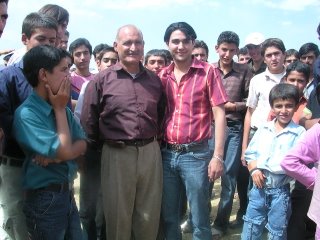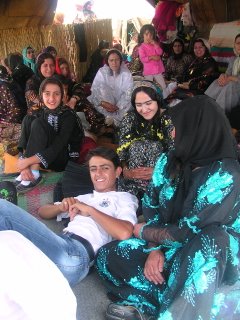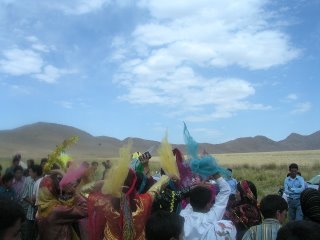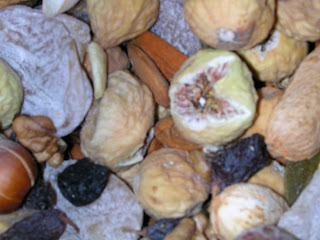The long post I promised... I will post pictures sometime soon...
Categories: iran, qashquai, travelTrip made just before Ramadan"Where are your fellow travelers from?" the police officer asks Keivan as we are about to board the train.
"The Global Arrogance," Keivan answers. The police officer laughs, stamps our tickets and sends the three of us through the gates where we hurry to meet the overnight train.
The train leaves the station exactly on time. A couple of minutes after departure, a porter comes by with clean sheets. We fold the seats down and make our beds. "This is great," our British friend says. "I just love the train. It's so comfortable, so great to sleep in."
"The cabins were larger when I was a kid," Keivan comments. It's his first train trip in Iran in more than 25 years.
"No, you were smaller. Trust me."
At 5 the train stops and we are woken up by the call to prayer booming in over PA system.

"They never let you forget where you are," our friend says sleepily.
We pull into the train station and take a cab into the city where we are meeting friends of friends who will take us out to a Nomad encampment some 2 ½ hours outside Esfahan.
We make our way through highways, small towns, dirt roads, gravel roads, and tarred roads and, after a spot of car trouble, head towards our destination where there is one teenage boy and some sheep.
"They're at the wedding," he tells us. "They'll be back in a couple of hours."
There are weddings everywhere in the encampments. We passed one on the way here and now our hosts are at another. We manage to get ourselves invited and are quickly surrounded by huge groups of young and old, women and men, boys and girls, all curious about the two foreigners in their midst. "George Bush is very, very dangerous," a teenage boy says to me.

"Aren't you afraid of me?" I ask jokingly.
"Afraid of you… No!" they laugh. "You are afraid of us!"
"Terrorist," says a boy pointing at his own chest. The others laugh. They know we think of them as terrorists.
"Take off your scarf," an older man tells me. "There are no religious police here. We do not care. You should feel free. We are free here."
"Did you know that Qom has a huge Bridgestone tire factory?" one of the men asks me.
"Really?"
He answers by circling his hand above his head in the shape of a turban. I am so gullible.
"Take off your scarf," another man says to me.
"Really it's okay," the man who brought us here tells me.
I refuse, but everyone assures me that it is fine. They do so often and with sincerity.
"Our scarves are for decoration," a woman tells me. "It is fine to take your scarf off here."
The women wear flowered headbands and transparent black lace scarves. Their long braids come out the back. Most have two long side curls framing their faces – a bit like Chassidic boys.
"Have you ever heard of BlackENdeker?" a man asks me. It takes me awhile to realize that he means Black and Decker.
"Is America better or Iran better?"
"Do you have any children?"
"How old are you when you marry?"
"Do you think that our women are beautiful?"
"We had many American teachers here before the revolution. There was Mr. Harmon and Mr. Ryder and many others." Among the over 40 crowd there are some who do speak pretty good English.
My friend and I are ushered to one of the many women's tents. Keivan and the two men who brought us here are guided to the men's area. The women's tent is crowded with women and children and a fair sampling of young men who are here to flirt.

The children tell me that my Persian is bad. The women tell me that it is good. It's my accent that is bad, they explain.

Every once in awhile, a man comes up to the tent and says something in a gruff voice (Speaking a Turkish dialect, so I do not understand). The women then make fun of him and he laughs. I am not sure what this whole play is.
"It's time to go get the bride," I am told after a lunch of koubideh and rice with zereshk. Yum. You could taste the life in the kebab. (Sorry to my vegetarian readers…) I am sure our sheep was alive the day before.
"You need to go meet the bride," the family of the groom assures me. They usher us off towards the waiting cars.
Keivan, Megan, and I hop onto the back of a pickup truck. The women inside offer to get out, but we insist on our right to speed through the desert on the pack of a pick-up. Wouldn't you?
We are not alone. Another couple joins us. "We had an American living with us 35 years ago," the man tells us. "Louis Beck."
"Louise Beck?"
"Yes. Louise."
(A later google search reveals her real name:
Lois Beck.)
"She was here for four years."
Megan turns to me, "I would love to do that."
"Me too," I respond. "She must be an anthropologist."
"We are 2000 years behind you," the man says. "But you have moved ahead too quickly. Your life is like a prison to us. What can compare with our stars? Our sky?"
We arrived at the tent of the bride who had just spent hours having hair removed. After spending the past few hours having her hair painfully remover, her eyebrows were trim and elegant. She was in a white gown and surrounded by women and girls.
"Dance!" The women command me.
"There's no music."
"Don't worry. We'll clap."
I dance. Megan is too shy to dance. Instead she laughs at my missteps. So do the other women.
We go outside the tent to join the circles of dancing people. They give me a couple of scarves to swing over my shoulders and make fun of my inability to pick up the steps. What can I say… It took me 14 years to learn the hora. I'm that bad, and I don't care.

Never pass up the opportunity to dance. As my great Aunt Rose always said, there are plenty of opportunities to mourn.
The BlanketWe take a break from the wedding to go pick up Megan's blanket. She is exchanging a digital radio for a heavy wool blanket. We sit with the family.
"Where are our pictures?" The older woman demands of our guide: Ahmad.
"I'll make you a copy of the CD and bring it to you next week."
"You won't bring it," the woman says to him. "Give us the CD, and we will make a copy and give it to you."
"I see Khosro every week. I will give him the CD. I promise."
I ask permission to take pictures. "Only if you give us copies," the woman tells me.
"Absolutely," I agree.
"Do you have farming where you are from?" the man of the family asks me.
"A lot. My parents live in one of the biggest farming communities in the world."
"Are there sheep."
"Yes."
"What kind?"
"They are not like yours. They are white with curly hair."
"Do they have pink faces like cows?"
"Kind of."
"Oh. You have Israeli sheep."
"They are similar to the sheep in Israel. That's true."
"Israeli sheep are too wild for us. They are difficult to care for."
"That's what my friend's father tells me," I answer. "He had thousands and thousands of sheep. He said they only liked him" I want to say that they were too emperamental, but I don't have the Persian word for temperamental.
The radio and the blanket switch hands.
"Don't trade that radio away," our young guide Hamid says. "Sell it to me, if you want to get rid of it."
Hamid wanders around the area with the radio until he finds a spot that gives him good reception.
"Don't worry. I am keeping this radio."
We take some pictures, say our goodbyes, and head back to Esfahan."



























